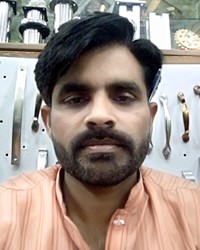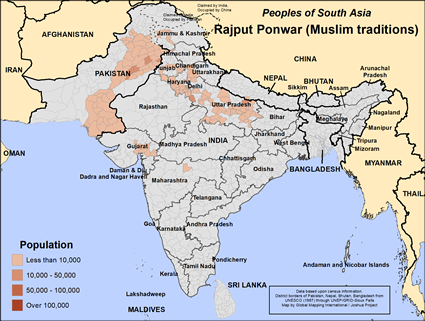Rajput Ponwar (Muslim traditions) in India

Photo Source:
Anonymous
|

Map Source:
People Group data: Omid. Map geography: UNESCO / GMI. Map Design: Joshua Project
|
| People Name: | Rajput Ponwar (Muslim traditions) |
| Country: | India |
| 10/40 Window: | Yes |
| Population: | 68,000 |
| World Population: | 834,000 |
| Primary Language: | Hindi |
| Primary Religion: | Islam |
| Christian Adherents: | 0.00 % |
| Evangelicals: | 0.00 % |
| Scripture: | Complete Bible |
| Ministry Resources: | Yes |
| Jesus Film: | Yes |
| Audio Recordings: | Yes |
| People Cluster: | South Asia Muslim - Rajput |
| Affinity Bloc: | South Asian Peoples |
| Progress Level: |
|
Introduction / History
The Rajputs Ponwar live in the north and central states of India. Rajput means "son of a ruler" in Sanskrit. Ponwar means descendants of the Paramara dynasty. This middle-sized kingdom flourished in the late medieval period in north central India. All Rajput Ponwar or Panwar were originally Hindus. With the coming of the Muslim sultanates, some Ponwar converted to Islam for spiritual and political reasons. They converted to Islam by clans not as individuals.
The Ponwar take pride in their warrior history. The British recruited them as soldiers during the colonial period. The Ponwar became landholders of large estates. Some Rajput Ponwar are wealthy landowners who have other castes work their land. Some are less wealthy and till the soil themselves. Their military tradition continues in the Indian Army. They hold positions of leadership in government.
The primary language of the Ponwar is Urdu. They also speak other regional Indian languages.
Where Are they Located?
Most Indian Rajput Ponwar live in the state of Uttar Pradesh. Some also live in Haryana and other north and central Indian states.
What Are Their Lives Like?
The Rajput Ponwar enjoy a high status in Indian society. They encourage their young people to pursue higher education. As Muslims, their women are often secluded in the home. When the women go out, they wear very modest clothing that covers their heads and bodies. Families arrange marriages within the Rajput caste but not within the near clan members. The ancient practice of child marriage is no longer followed. Sons inherit property. They are non-vegetarians but as Muslims they do not eat pork.
The Rajput Ponwar lives revolve around the five daily prayers. They attend services at their local mosque on Fridays where they mingle with other groups of Muslims.
What Are Their Beliefs?
The Rajput Ponwar are Sunni Muslims, the large majority portion of Islam. Once in their lives they make a pilgrimage to Mecca that is called the Hajj. During the Hajj they perform certain rituals that reinforce their identities as Muslims.
The Rajputs participate in the two yearly Muslim holidays of Eid al-Fitr, the celebration of the breaking of the monthly fast of Ramadan and Eid al-Adha or Feast of Sacrifice that celebrates Abraham's willingness to sacrifice his son. Since the holidays are based on the lunar calendar, the dates change every year.
What Are Their Needs?
The Rajput Ponwar need humility and God's grace to see themselves as sinners who need a Savior. They must realize that no human works will ever satisfy a holy God. They need to see the love of Christ lived out before them.
Prayer Points
Pray the Lord sends Christians to befriend the Rajput Ponwar and show them the love and mercy of God.
Pray that Rajputs living outside of India would become Christians and return to India to share the gospel with their people.
Pray that the Holy Spirit leads many Rajputs to Christ and that growing
churches are planted among them.